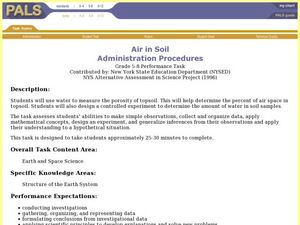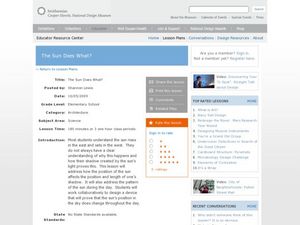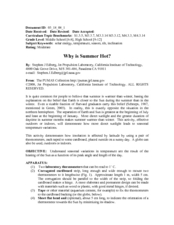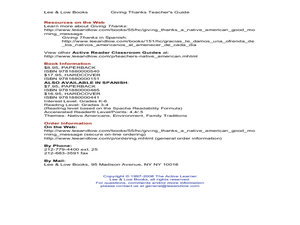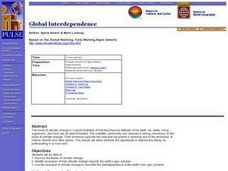Curated OER
The Formation of Soil
Students identify the different components that make up soil. In this earth science lesson, students create a pamphlet for next year's class. They analyze how erosion and weathering shape the Earth.
Curated OER
Soil Comparison and Analysis
Students perform tests on different soil samples. In this earth science lesson, students classify the soil into groups according to test results. They write a lab report following a certain criteria.
Curated OER
Air in Soil Administration Procedures
Students study soil and its composition. For this soil composition lesson, students study examples of soil during several days of aeration. Students summarize their data, organize it, and must be able to explain their findings.
Curated OER
Rock Cycle
Students explain the processes involved in the rock cycle. In this earth science lesson, students identify the different kinds of rocks. They complete a worksheet during the activity.
Curated OER
The Joy of a Garden
Students study environmental stewardship. In this environmental stewardship instructional activity, students read the story The Gardner and define the character's actions for the environment. Students define philanthropy and complete a...
Curated OER
Modeling the Change of Seasons
Students evaluate data to determine changes in length of day. They model the revolution of Earth around the sun to show changes in length of day and sun angle and illustrate how the sun angle affects the change of season.
Curated OER
Follow the Sun
Students use a simple model of the Earth and Sun as seen from space to explore the sun's apparent movement across the sky over the course of a day and year. They consider the apparent direction of movement and changes in the sun's angle.
Curated OER
The Winter Solstice
In this winter solstice instructional activity, students read a detailed text about the winter solstice and the historical and religious significance of this day. Students then complete a 15 question fill-in-the-blank and true/false...
Curated OER
Why Do We Have Night?
Students engage in a fun, creative way to discover how the Earth moves. This instructional activity helps students explain why there is day and night. It can also create curiosity to further study the solar system and eclipses!
Curated OER
Coronal Mass Ejections
In this coronal mass ejections worksheet, students observe a time line of events that took place during a solar storm. Students use the time line to answer 3 questions about the solar storm and the time it took to reach Earth. Students...
Curated OER
Cut and Paste Moon Phases Activity
In this phases of the moon worksheet, students are given pictures of the phases of the moon and they cut them out and paste them to a diagram with the names of the phases. They answer questions about the moon, the phases and the rotation...
Curated OER
Lunar Lollipops
Students simulate the phases of the moon using a lamp and styrofoam balls. In this lunar phases lesson, students stand around a lamp and act as Earth. They hold styrofoam balls and rotate to show the phases of the moon.
Curated OER
The Sun and Moon
Students understand basic concepts about Earth, the Sun and the Moon,
such as relative movement and the phases of the moon. Through discussion, looking at pictures, listening to Native American stories, observing, and building models,...
Curated OER
Spinning in Circles
In this secondary mathematics worksheet, students determine the speed at which we travel a circle around the axis of the earth and around the sun. The one page worksheet contains one problem. A solution is provided.
Curated OER
Me and My Shadow
Students apply the process of scientific inquiries or technological design to explore the explanations of the daily patterns of the Earth's rotation. They record different shadow lengths showing the apparent movement of the sun through...
Curated OER
Importance of Water
Students complete a KWL chart on what they comprehend about water. They complete a water activity determining how much usable water is available, and they determine the water usage in their households. Students take notes on water and...
Curated OER
Astronomy with a Stick
Students describe the movement of the Earth as it relates to the sun and
formulate a hypothesis for the movement and the changing length of the shadow. They express the relationship between the sun and the Earth and how that causes the...
Curated OER
Water Pollution Prevention and Conservation
Students examine how to conserve water. They also discover how to prevent water pollution. They examine the Earth's water distribution as well.
Curated OER
Minerals and the Products of Mining
Students plot where minerals come from and have an awareness of how mineral use makes the world interdependent. They examine how to identify some sort of mineral products they use each day.
Curated OER
The Sun Does What?
Learners examine why the sun rises in the east and sets in the west. In this sun lesson, students explore the sunset and shadows. Learners prove that the sun's position changes during the day. Students investigate what causes a shadow....
Curated OER
Why is Summer Hot?
Students examine how variations in temperature are due to the Sun and length of day. In this solar lesson students complete a lab activity using thermometers and artificial sunlight to see how the earth is heated.
Curated OER
Classroom Meteorologists: An Experiential Approach to Learning about Seasons and Weather
Students examine several concepts about weather in the seven lessons of this unit. This year long activity helps students to gather data seasonally about wind, clouds, precipitation, and temperature. Earth's three climate zones are...
Curated OER
Lee & Low Books: Giving Thanks Teacher's Guide
Fourth graders participate in reading comprehension activities associated from a teacher's guide. In this reading comprehension lesson plan, 4th graders read Giving Thanks: A Native American Good Morning Message by Chief Jake Swamp and...
Curated OER
World Geography: Global Interdependence
Students are able to discuss the theory of climate change. They identify examples of how climate change impacts the earth's geo-spheres. Students are able to use the example of climate change to describe the interdependence of the...
Other popular searches
- Earth Day Activities
- Earth Day Writing Activities
- Earth Day Art
- Earth Day Art Project
- Earth Day Writing
- Earth Day Lesson Plans
- Earth Day Lessons
- Earth Day Games
- Earth Day Unit Plan
- Earth Day Participation
- Earth Day Word Search
- Letters for Earth Day




